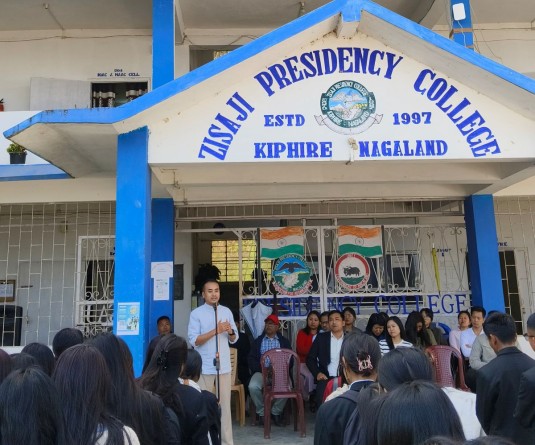Participants at the two-day regional workshop on National Adaptation Plan held in Dimapur. (Photo Courtesy: PIB)

Regional workshop on National Adaptation Plan concludes
DIMAPUR, APRIL 16 (MExN): A two-day regional workshop focused on India’s forthcoming National Adaptation Plan (NAP) concluded in Dimapur on Tuesday. The event, organized by the Ministry of Environment, Forest and Climate Change (MoEFCC) in collaboration with the Government of Nagaland and GIZ as the technical partner, brought together representatives from eight northeastern states, technical experts, and development partners to discuss climate change adaptation strategies.
A PIB report stated that the workshop aimed to address region-specific vulnerabilities and identify sectoral priorities and adaptation solutions. States participating included Arunachal Pradesh, Assam, Manipur, Meghalaya, Mizoram, Nagaland, Sikkim and Tripura.
In his inaugural address, Nagaland’s Minister for Environment, Forest and Climate Change, CL John, highlighted the Northeast's exposure to climate-related risks such as floods, landslides, and biodiversity loss. He stressed the importance of incorporating traditional knowledge and community-based practices into adaptation planning.
MoEFCC Deputy Secretary Ruchika Drall noted that the National Adaptation Plan is being developed as an inclusive and participatory document, aligning with global climate commitments under the Paris Agreement. She emphasized the role of regional consultations in grounding the plan in local realities.
Over five thematic sessions, participants discussed a range of issues, including disaster resilience, infrastructure planning, health risks, traditional livelihoods, biodiversity conservation, and financing for adaptation. The discussions acknowledged the region’s unique ecological vulnerabilities and dependence on agriculture and forest-based livelihoods.
Key Recommendations
Key recommendations included regularly updating state-level climate vulnerability assessments, integrating disaster resilience into infrastructure projects, and strengthening public health systems against climate-related risks such as vector-borne diseases. There was also a strong call for increased community engagement, particularly involving women, indigenous groups, and youth in adaptation planning.
The need to mobilize climate finance and align state and central government schemes for effective implementation was also highlighted. Capacity-building at the local level and enhanced institutional collaboration were identified as critical steps for advancing adaptation efforts.
During the inaugural session, two documents were released- Sectoral Vulnerability Assessment to Climate Change for the State of Nagaland – A Summary and the State Action Plan on Climate Change and Human Health.
The workshop concluded with a consensus on the importance of continued regional cooperation, stronger institutional linkages, and the integration of northeastern states' perspectives into the national climate adaptation strategy.





